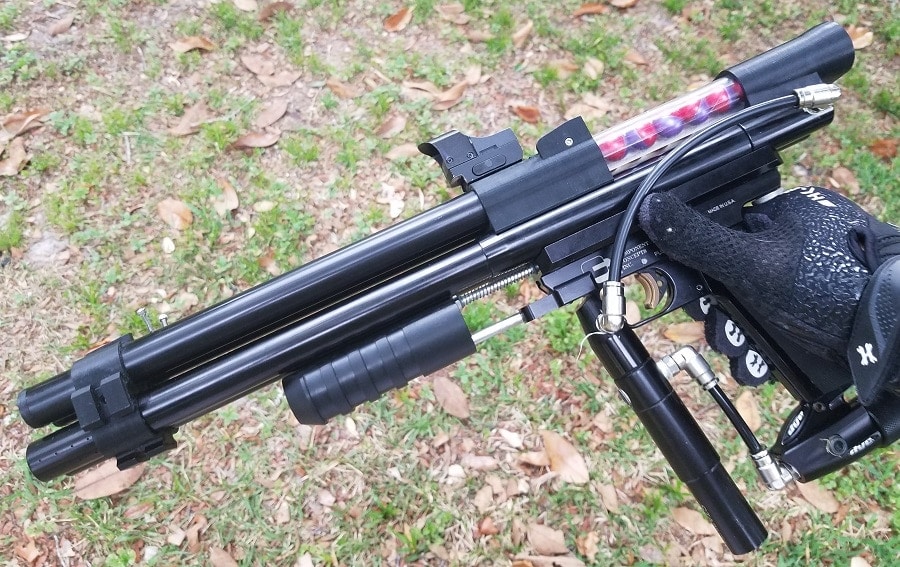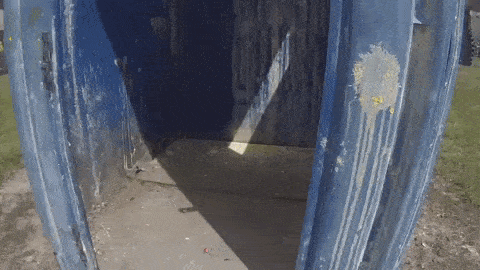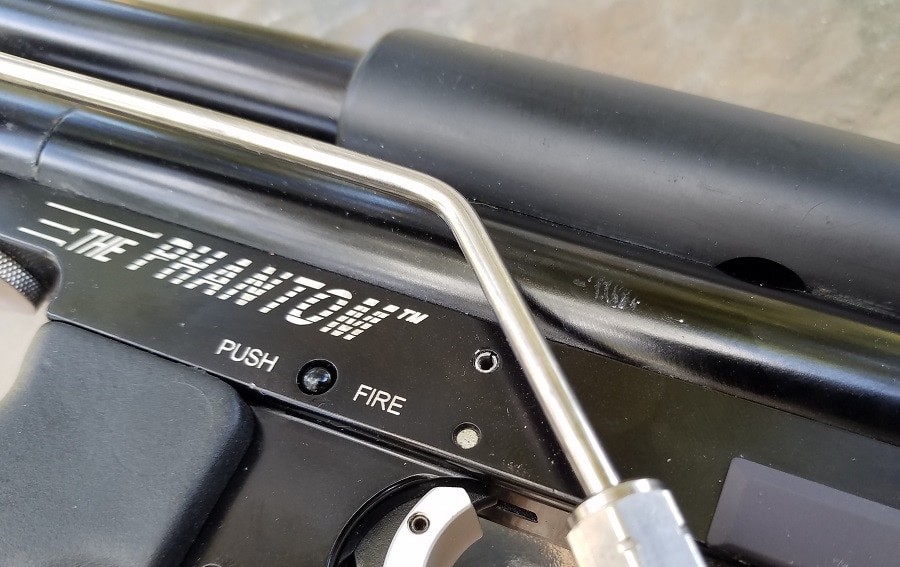Table of Contents
The CCI Phantom
The Phantom made by Component Concepts Inc. (CCI) is by far my absolute favorite pump paintball maker available today! From its simple light weight design to the ease of customization, a player can find a phantom setup to fit most any need!
I have been using phantoms since 2008 in a multitude of configurations and have loved playing with them ever since. They are so light weight, compact, and simple that I can just pick one up and use them the entire day without wearing down quickly.
Over the years, I have owned a bunch of phantoms from super basic open class setups to a double barrel setup! Each have their own charms and are always fun to hit the field with.

Pros
The phantom has been around for over 30 years for a reason, it is a very well built paintball marker that not only just works but requires very little maintenance to keep running.
Here are my favorite features of the Phantom:
- Simple Design – The Phantom is a Nelson based paintball marker, making it super simple and compact in design. All of the internal moving parts are inline and don’t need any special tools to disassemble.
- Light Weight and Compact – Because of the Phantoms simple design, it is also a super light weight and compact paintball marker as well! Every person that I hand my phantom to always comment on how light it is compared to their setups.
- Minimal Maintenance – Unless you manage to drop your marker in a puddle of mud or break paint inside of the marker, there isn’t any need to do a full tear down of the phantom or make adjustments. With very few o-rings to replace, the need to fix leaks is very rare.
- Toolless Disassembly – The modern phantoms you see today come with thumbscrews holding the frame to the body. These two screws can be removed by hand and hold the entire assembly together! Accessing the internals for routine maintenance takes seconds and you can have the entire marker cleaned and put back together in the matter of minutes!
- Durability – I am hard on my gear. Sometimes I trip and fall into trees, bunkers or fall flat on my face. More than once have I slammed my Phantoms into a hard surface and worried that I have damaged something. Not once have I had my phantom go down on the field because of lack of maintenance or physical damage.
- Affordability – New from the manufacture, the Phantom is competitively priced with other pump paintball markers on the market and even more so when buying used! You can find them for a great price used on Ebay by clicking here!
- Lots of Configurations – The Phantom is more commonly known for its stock class configurations (10 round tube and 12 gram CO2) but can be found in a bunch of different configurations. Check out the Configuration section below to view several of the common layouts that people use.
- 12 Gram CO2 Efficiency – When purchased straight from the manufacture, the Phantom is set up for CO2 and is super efficient when running 12 Grams. I average between 30-35 good shots (above 240 fps) per 12 gram.
- Whisper Quiet – Because the Phantom uses so little air per shot, the sound signature when shooting is very small. I often hear people I eliminated saying “I have no idea where it came from” in the staging area.
- Great Accuracy – Right out of the box, these markers come with an excellent quality barrel and requires no upgrades to shoot straight and true. The only thing you will need to do is grab some quality paintballs and let them fly!
- Auto Trigger Comes Standard – The nelson design allows for the Phantom to come standard with an auto trigger (hold down the trigger and keep pumping to shoot). This is great for players wanting to have the ability to shoot just a little faster than a regular pump.
- Crisp Trigger Pull – Some pumps like the Azodin KP3 have a long trigger pull or require you to adjust where the trigger will release like with Autococker pumps. The Phantom has a nice, short, and crisp trigger pull right out of the box with no need to make any adjustments.

Cons
The Phantom may have a bunch of great key features, but there are a few downsides that may make it harder for some players to use them.
- Heavy Pump Stroke – Because of the Nelson design, the hammer has a heavier spring that must be compressed to fire each shot. It is more noticeable with the stock “around the barrel” style pump handles like the one shown above, but is much easier to pump with an undercocking kit.
- CO2 vs HPA – Stock from the manufacture, the marker is set for CO2. If you want to use HPA, it is ideal to pick up the spring kit and swap out the main spring with the heavier red main spring to open the valve up a bit more. If you don’t your velocity may be a bit low.
- Stock Pump Handle is Small – For someone with larger hands, they will find the stock pump handles a bit harder to manipulate in the middle of the game. I personally always swap out the stock pump handle with the CCI Dual Rod Pump Kit or other pump kits with larger handle to hold on to.
- Sits Low in the Hands – Second to the pump handle being a bit harder to manipulate, another common complaint is that it feels different in the hands when compared to other pumps. The phantom does sit a bit lower in hand when compared to stacked tube pumps and will take a little practice and mental adjustment to get use to shooting.
- Need Tool to Adjust Velocity – My biggest complaint about the phantom is the need for a velocity adjustment tool. It is basically a long tool with a plastic tip you stick down the barrel to engage the velocity screw inside the front bolt. You can use a long Flathead screwdriver to adjust the velocity as well, but then you may scratch the inside of your barrel. The tool is cheap, I would just pick one up from CCI’s website.

Why I Will Always Have a Phantom
I have used a bunch of different pump paintball markers over the years, but always finding myself coming back to the Phantom as my go to pump.
Starting off, I don’t have any buyers remorse when using my phantoms. They are affordably priced, have a bunch of different configuration options from both the manufacture and from aftermarket parts. Plus, I am not so worried about the normal wear and tear from play like I would be with the expensive pumps.
They just work. Lately, I don’t have as much time available to me to constantly maintain, tune, and replace o-rings all the time. I know some of you are the same way and can appreciate a “pick up and go” setup that you can just hit the field with and not worry if they will work. My Phantoms sit in the gearbag until it is time to throw some paint and run without any problems each time.
They don’t wear me out. I play a lot of 2 day or 24 hour scenario events and can be on the field for hours at a time. When using a regular setup, the weight of a full hopper alone can wear out your arms after a while. If using 10 round tubes, your overall gear and setup will be super light allowing you to maintain your stamina for a long day of play.
Configurations
The Phantom comes stock in two primary configurations Stock Class and Open Class. If you want to learn more about the differences between the two types check out the article I wrote on the subject here: https://www.paintzapper.com/stock-class-vs-open-class-paintball/
Stock Class

The most common phantom configuration you will see people using are stock class setups. These use 10 to 15 round horizontal feed tubes with a 12 gram CO2 changer.
The picture above is the more sought after Vertical Stock Class (VSC) Phantom. The front grip in front of the trigger is actually the air source holding a 12 gram CO2 cartage.
Open Class
There are quite a few players that don’t want to be limited to 10 rounds or have to use CO2 cartridges but want to use a hopper and tank instead. Thankfully, there are different options available to have a vertical or offset feedneck and either use a Back Bottle Air source or have your ASA under the grip like most paintball markers on the market.
Custom Configurations and Designs

There are so many different parts you can add to your Phantom and the possibilities are essentially endless! I currently have two highly customized phantoms that I thoroughly enjoy using.
I have seen other peoples Phantoms that have rifle stocks on them, are super short and compact, and have a pneumatic pump assist. They are easy to modify and upgrade with a bunch of options on the market.
Here is a quick video of my double barrel phantom in action scoring an awesome elimination.
If you want to check out my Phantoms click the links below:
My Single Barrel Phantom
My Double Barrel Phantom
Modifying Your Phantom
Upgrading and modifying your phantom is easy to do and the parts are relatively easy to find on both the new and used market. I have a handful of places that I regularly go to find various parts for my phantom if I want some random upgrades:
PhantomOnline.com (CCI’s website)
PaintballGateway.com (Has lots of new parts)
Ebay.com (Great source for new and used parts)
MCarterBrown.com (Paintball Forum that focuses on oldschool gear and pumps)
Upgrades
– Barrels
The stock barrels are great quality and shoot straight right out of the box. You don’t have to upgrade the barrel but if you do I highly recommend picking up one of CCI’s C-Bored Phantom Barrels as they allow you to use the standard 5″ freak inserts to match the paint bore size.
Matching the barrel bore size to the paintball helps prevent paint from rolling out the barrel and increases efficiency.
– Spring Feeds
I personally am a big fan of spring feeds. They aren’t considered stock class feeds but allow you to constantly feed paint without having to “rock and cock” like you would with a standard stick feed. They are also handy for firing quickly and using the auto trigger.
I personally use the Apocalypse Paintball Dual Pheeds on both of my phantoms and found them be some of the best designed spring feeds on the market.
– Pump Handles

Upgrading the pump handle is one of the first things I recommend to anyone picking up a phantom. Having that extra area to grip when cocking your Phantom makes things easier to pump mid battle. It also helps me not wear out my hands when playing long scenario events.
My two favorite pump handles are the CCI Dual Rod Pump Kit and the Rainman Phantom Undercocking Kits (if you can find them, they are kinda rare).
– Internals
I personally think the stock internals are perfect and don’t need to be upgraded at all. There are some upgrades like the fluted bolt but never found the need for one.
The only internal parts I recommend picking up is the CCI Spring kit so you can switch back and forth between CO2 and HPA.
– Triggers

The stock trigger gets the job done and by adding a trigger shoe makes it a very comfortable trigger pull. But there is some room for improvement.
I developed my own trigger upgrade for the CCI Phantom, the Wraith Trigger. This has a stainless steel ABEC-5 ball bearing giving a smoother trigger pull and comes with a lighter return spring for a nice crisp trigger pull.
Click here for more details on the Wraith Trigger.
– External Additions
External upgrades like new grips, external pressure gauges, red dot sights are all super common additions to everyone’s phantoms. The CCM 86* grip frame is my favorite frame as it is nice and thin and allows me to use a bottom line ASA.
I even made a magfed adapter for the Phantom! It allows you to use Tippmann TiPX mags and ZetaMags on your phantom. You can check out the details here: paintzapper.com/mak/
Modifications
– ASP Detent Mod
All closed bolt paintball markers suffer from rollout if they aren’t using a barrel kit to match the paint size to the barrel bore size. A great way around this is using the ASP detent mod.
This mod makes 2 cuts into the body to install o-rings to act as ball stops to prevent double feeds and prevent the paintballs from rolling out the barrel. Check out their website for all the details:
https://airsoldier.com/product/asp-phantom-detent-modification/
– Side Saddle CO2 Lever Changer

Of all the Phantom 12 gram CO2 changers on the market, I enjoy using the ICD lever changer in a side saddle configuration like the one shown above. This allows you to flip the release and change out your 12 gram in seconds.
All you have to do is flip open the lever with your thumb, which will eject the spent 12 gram, slam in a new 12 gram, and close the lever. Check out the gif below to see how it works:

They are easy enough to make. You will need to tap your valve on the left side with a 1/8 NPT tap, a 1/8 NPT straight fitting, a standard ASA, and the lever changer.
You may have to tap the valve body sorta deep so you can get a flush fit. I like to use the duckbill ASAs as you can cut off the excess easily and have a flush fit.
Conclusion
These pumps have been on the market for decades but are still one of the best pumps on the market today. This shows how well they were made back then as they continue to be a relevant pump paintball option today.
I doubt that I will be dropping either one of my phantoms within the near or distant future and will continue to field them for recball and scenario events.
If you are contemplating a great pump, the CCI Phantom is going to be a great option for most every player looking to get into pump paintball.

